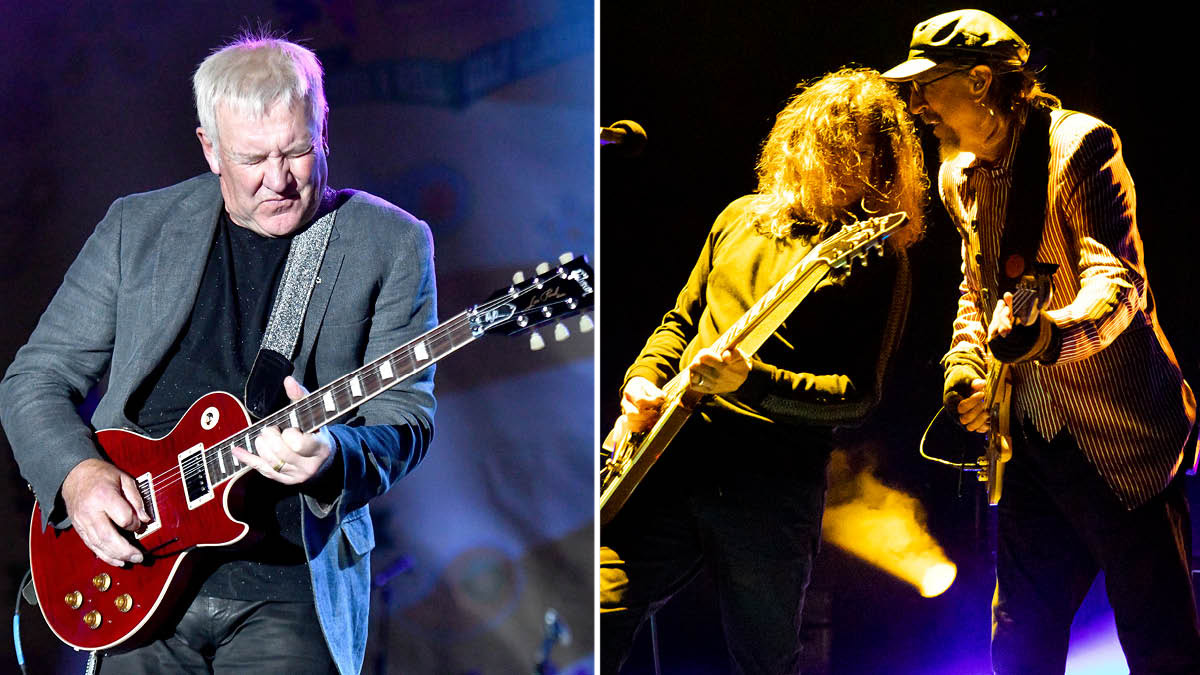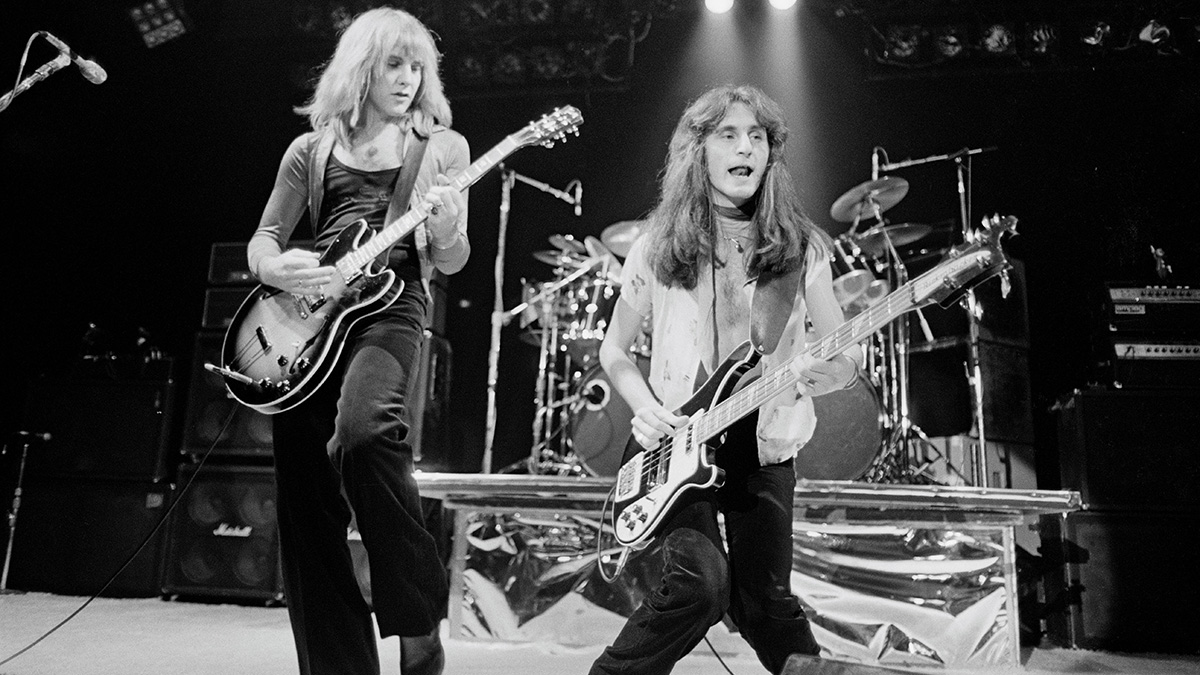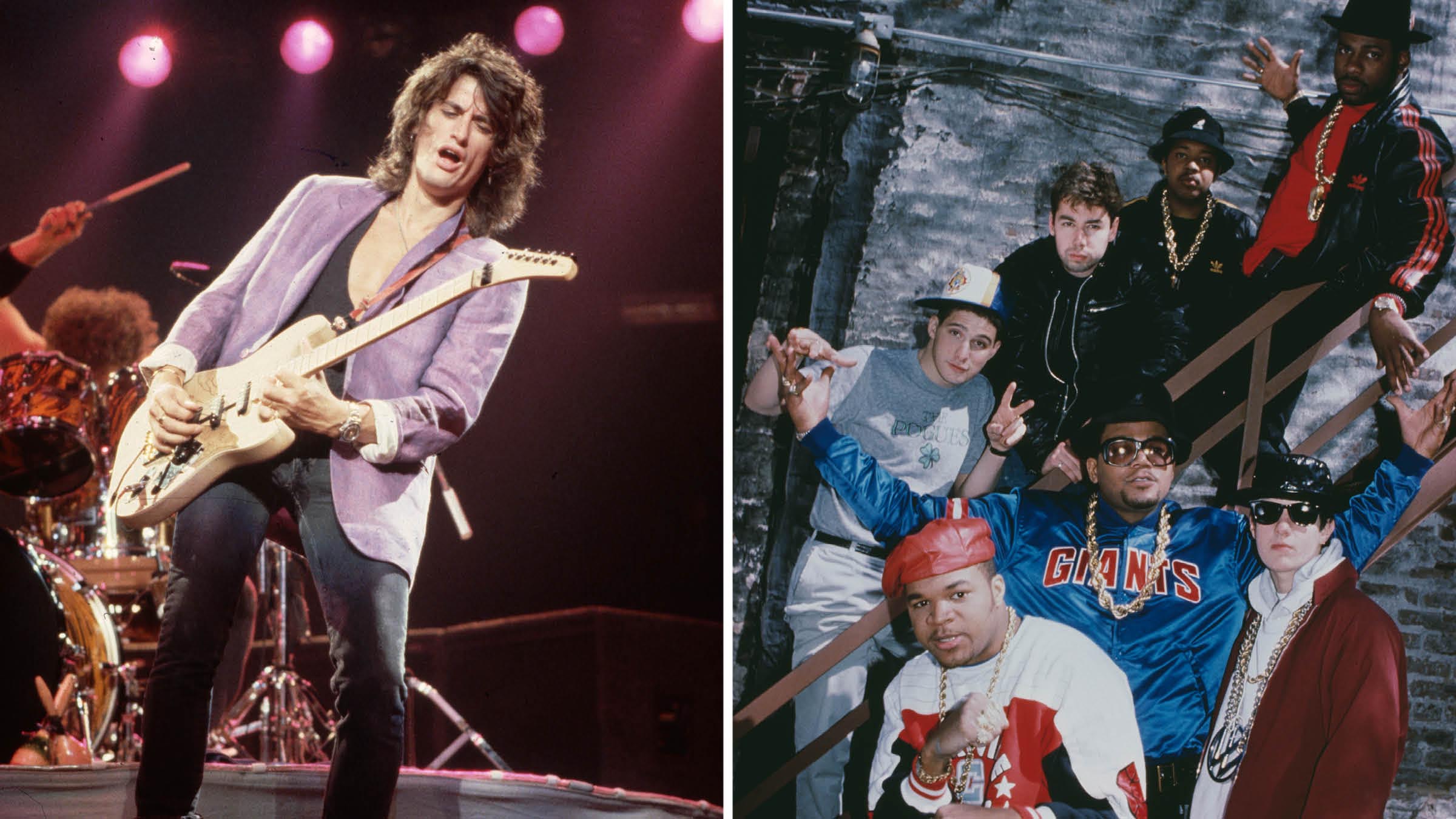Larry LaLonde and Les Claypool join Alex Lifeson to discuss A Farewell To Kings and recall that one time the Rush guitarist used a tortilla chip as a guitar pick

All the latest guitar news, interviews, lessons, reviews, deals and more, direct to your inbox!
You are now subscribed
Your newsletter sign-up was successful
“Honestly, this whole thing started as a joke,” says bassist Les Claypool, explaining how he and his Primus bandmates – guitarist Larry “Ler” Lalonde and drummer Tim Alexander – began covering Rush’s 1977 album A Farewell to Kings from start to finish. “Then one day it was like, ‘Hey, wait. Maybe this isn’t a joke. Maybe we should actually do this.’”
Claypool quickly points out, however, that at first the band considered paying tribute to their musical heroes by playing that album’s follow-up, 1978’s Hemispheres, but there was one little hitch: “Hemispheres has Cygnus X-1 Book II on it,” he says, “and we couldn’t really go out and play that one without doing the first one – that would be a little strange.”
For a second or two, the band even tossed around the idea of covering Rush’s grand sci-fi classic 2112, but Claypool thought that such a gesture would be deemed “too obvious.”
“So we decided to play A Farewell to Kings,” he says, “which made sense because it has Cygnus X-1 Book I. Plus, that was the first Rush album I ever heard. I remember seeing Cygnus as a kid and watching the Rocinante spaceship flying through the black hole and just ejaculating in my pants and thinking, ‘That’s the greatest thing I had ever seen.’”
Ever since Primus opened for Rush in 1992, the members of both bands have remained tight. Recalling his reaction when he was told that Primus planned to tackle A Farewell to Kings live, guitarist Alex Lifeson says, “I thought to myself, ‘I hope Ler gets those chords right.’”
He laughs. “You know, the song A Farewell to Kings has some quirky chords in it, especially the ones that are up high on the neck. And with Xanadu, I thought, ‘Oh, my God. The poor guy’s going to be suffering night after night with that 40-pound guitar on his shoulder.” He adds, “But seriously, I thought it was great. What an awesome idea.”
Originally, Primus planned to take their A Tribute to Kings tour – a full reading of A Farewell to Kings followed by a set of their own songs – out on the road in 2020, but once Covid effectively shut down the global concert business for the next 18 months, they were forced to postpone those dates until last year. Lalonde notes that the unexpected time spent at home had its benefits.
All the latest guitar news, interviews, lessons, reviews, deals and more, direct to your inbox!
“To be honest, it meant I could use all of that free time to actually figure out these guitar parts,” he says. “Like Alex said, these songs aren’t that easy to play. I found out the best way to learn the chords was to simply email him and ask him what they are. And that heavy guitar as well [a Gibson EDS-1275 doubleneck] – I’m using one he sent me, but I found out he put bricks inside of it. It’s twice as heavy. There’s bricks inside of it. I’m sure of that.”
It should come as no surprise that people love these songs, and they love seeing them being played and hopefully not butchered too bad
Larry LaLonde
Lifeson lets out a good-natured laugh, but he doesn’t dispute whether he did or didn’t add any weight to the guitar. “It feels that way,” he says. “The 2021 A Tribute to Kings tour was enthusiastically received by fans of both bands, so much so that Primus are setting off on another such excursion this spring, and for the first time the itinerary will include stops in Rush’s home turf of Canada.
“I’m glad that people are into seeing it,” Lalonde says. “It should come as no surprise that people love these songs, and they love seeing them being played and hopefully not butchered too bad – at least myself.
“That love is reinforced when I meet people who come out to the shows. A lot of them say how emotional it was to see these songs being played. They’d sing along to them. For me, it was cool to see how much people love this band.”
In the following interview, Claypool, Lalonde and Lifeson discuss Primus’ A Tribute to Kings tour, and Lifeson reflects on the recording of the iconic album behind it all.
Alex, I’m curious. Did Rush ever play A Farewell to Kings in its entirety?
ALEX LIFESON: “I would guess so. I mean, we did some of the songs.
LES CLAYPOOL: “I asked Geddy about this. I looked this up because I have that big giant book of all the set lists. You know the one, right?”
LIFESON: “Yeah, yeah.”
CLAYPOOL: “It’s got everything – how much you guys got paid. The ticket prices are amazing. I asked Geddy if you guys ever did “Madrigal” live, and he said no. I’ve never seen it on a set list.
LIFESON: “No. No, there was always one or maybe two songs we would record knowing we would never play them live. That was certainly one of those songs. Different Strings [from Permanent Waves] was another.”
CLAYPOOL: “Madrigal has become the song where Ler and I embrace each other on stage as we perform it. Sensitive, sensitive tune, you know?
Both bands hit it off when you played together in 1992. You would even jam with one another after sound checks, right?
LIFESON: “We did. We would do sound check at 4:30, and then Primus would set up and they’d do their sound check. We’d have dinner at 6, and then we would have a jam, usually in our dressing room or in a hallway that was nice and echoey. At one point, the deal was that you had to go out and get an instrument you couldn’t play. Ler, I think you got a clarinet.”
LARRY LaLONDE: “That’s right.”
LIFESON: “I got an accordion and a flute. We all played these instruments we had no idea how to play. We actually recorded these jams. I don’t know what happened to those recordings, but we did them everywhere.
“When we played in Berlin together, just after the wall came down, we had a jam outside around the corner from the parking lot of the arena. There was a little grassy area outside the stage door, and I remember setting up there. Neil had his practice kit, I think.
LaLONDE: “I saw Alex using a tortilla chip for a guitar pick one time. That was pretty sweet. [Laughs]”
When you say ‘jam’, what kinds of songs would you play? What’d it sound like?
LaLONDE: “It sounded like somebody asked, ‘What would it sound like if someone had just bought an accordion that day?’ That’s the kind of music it was.”
CLAYPOOL: “I will say, one of the greatest things I ever experienced was during one of those jams in a sports arena locker room and watching Neil play the lockers as his percussive instrument. It was amazing.”
Bearing in mind that the tour is called A Tribute to Kings, I’m curious if any of you have seen actual Rush tribute bands.
CLAYPOOL: “On YouTube, I’ve seen – what are they called – Rash? They’re the one band that’s pretty popular. I see Geddy wearing their shirts.”
LIFESON: “Yeah. He’ll endorse anybody. [Laughs]”
LaLONDE: “I saw them with the Gillettes.”
LIFESON: “I haven’t seen any. I don’t really think about it, to be honest with you. I guess it’s a nice compliment that someone would take the time to learn your songs and play them. I suppose we’ve all been tribute bands at one time, learning other people’s songs when we’re starting out. I don’t know… I don’t really think about it.”
It’s a whole different subgenre from what Primus is doing here. Full-fledged tribute bands get the whole thing down – the attire, the way the members look.
LIFESON: “Yeah, that’s pretty crazy. I don’t know why you’d want to look like Geddy. [Laughs]
CLAYPOOL: “I already look like Geddy. [Laughs] I have four silk robes I bought for this tour.”
LaLONDE: “Yeah, that’s how you get the sound.”
CLAYPOOL: “Exactly. It sounded terrible until we got the robes.”
LIFESON: “More scarves.”
LaLONDE: “Yeah, we need scarves. We’re deficient in scarves.”
What about Primus tribute bands? Les and Ler, have you checked out any?
LaLONDE: “Not really. I think I’ve seen some clips people have sent me, here and there. People send me, like, a two-second clip or something – I’m assuming it’s a cover band or someone playing a song.”
Alex, have you been to any of the Tribute to Kings shows?
LIFESON: “No, I haven’t been out of this city in two years. I would love to see them. I think there’s a Toronto date coming up this summer?”
CLAYPOOL: “Massey Hall.”
LIFESON: “Massey Hall’s beautiful. They’ve just done a major, multimillion-dollar restoration of the place. I just did a gig there for Andy Kim.”
Have you seen any videos of Primus from this tour?
LIFESON: “No, I haven’t. I’m still trying to figure out how to work my computer or iPad. I’m waiting for the real thing. I’m sure it’s awesome.”
LaLONDE: “He’s waiting to see me play the parts wrong in person.
Ler touched on how hard it was to nail some of the chords in this material. Les, were there any difficult aspects for you as well?”
CLAYPOOL: “Oh, my God, yes. [Laughs] The vocals were very difficult. I mean, everything about it’s very difficult – it’s frickin’ Rush! Besides having to put on a big cinder block of a double neck instrument around your neck every night… I have to say, I love playing Primus songs, but every night I look forward to playing A Farewell to Kings because it’s just so much fun.
“About the vocal parts, I kind of figured out a little trick of Geddy’s, which I won’t say, because I think I think it might be a secret.
“Finally, my son just said, ‘Dad, quit trying to sing it like Geddy. Just do it your own way.’ So I just kind of did that. I have some stuff that’s sort of in the upper register, so I would just take on these characters, like Sgt. Baker [from Primus’ 1991 album Sailing the Seas of Cheese] … And, of course, there’s the keyboard parts. But once you’ve got it, you’ve got it.”

Did playing the same instruments as Rush used at that time help you feel more “Rush-like”?
CLAYPOOL: Yes. And the robes! [Laughs]
LaLONDE: For me, it definitely did. One of the hardest but most fun parts is trying to switch between the necks. There’s a video that shows how Alex does it. It’s one of my favorite parts of the whole night, trying to get that sweeping across and flipping the switch back.
LIFESON: “You’ve got to be quick.”
LaLONDE: “You do! But there is a video out there – I think it’s from Moving Pictures. There’s one little section I saw where they show you do it back and forth. I was like, “Oh, what’s that?” I froze it. I watched it, like, a hundred times trying to figure it out. It’s awesome.”
Alex, A Farewell to Kings is often cited as a breakthrough album for Rush. Does it hold a special place in your heart?
LIFESON: “Yeah, it does. I remember when we were in the studio recording it and the mood we were all in at the time. We had done a tour of Britain before the album. It was the first time we toured there and the promoter didn’t expect anything, but we actually did really, really well.
“We came back to record the album there, and it was the first album that we recorded in Britain. It was really a great experience for us to go back to the roots of the music we listened to when we were young. Rockville was a very cool, very rural kind of studio, not fancy at all, but it had a good sounding room and a great sounding console. We had so much fun recording, as we always did.
“And then playing this stuff – Closer to the Heart – became quite a big song for us, and Xanadu was always a treat. Xanadu was the first song we recorded, and I remember we played it once from beginning to end so that the engineer, Pat Moran, could get levels.
“We played it one more time, and that’s the take that’s on the album. We did all 11 minutes of it, and Pat was like, “What?! They switched guitars – what the fuck?” [Laughs] He was so impressed. And then we got to the second song, which Cygnus or something where it was a little more tedious and more hard work. [Laughs] Back then we used to prepare. We used to go into the studio with songs written and ready to go. And it was certainly one of the last examples of that.”
Any thoughts on doing another Rush album after this tour?
LIFESON: “Uh, no. [Pause] Are you talking to me?”
Oh, no, no! I’m sorry. No, I meant the Primus guys.
LIFESON: “Oh, OK. [Laughs]”
CLAYPOOL: “I mean, we have to do Hemispheres at some point in time; at least we’ve got to do Cygnus Part II, just because you’ve got to finish the sandwich, you know?”
LaLONDE: “And I already know how to play it. One of the ways I learned how to play guitar was learning all the stuff from Hemispheres. It’s like, I’d never seen these chords anywhere before; all my guitar heroes didn’t play these chords. So that’s how I learned them.”
LIFESON: “I’m to help you with those chords if you need it – if I can remember.”
LaLONDE: “You’re going to regret that offer.”
- See Primus for all dates on the A Tribute To Kings Tour.
Joe is a freelance journalist who has, over the past few decades, interviewed hundreds of guitarists for Guitar World, Guitar Player, MusicRadar and Classic Rock. He is also a former editor of Guitar World, contributing writer for Guitar Aficionado and VP of A&R for Island Records. He’s an enthusiastic guitarist, but he’s nowhere near the likes of the people he interviews. Surprisingly, his skills are more suited to the drums. If you need a drummer for your Beatles tribute band, look him up.

